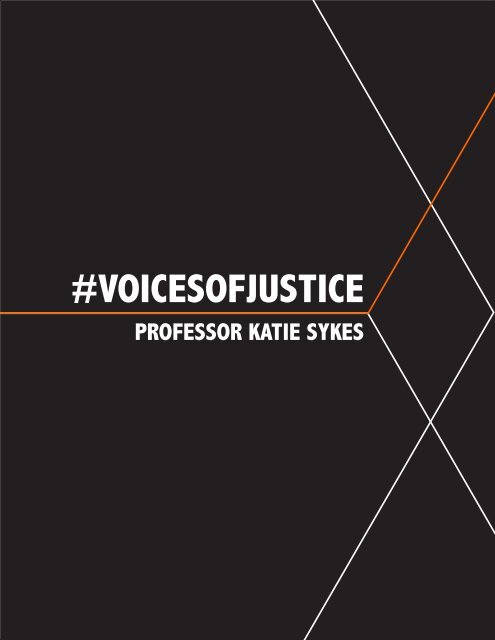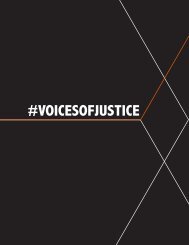Katie Sykes – The Justice Hack – Voices of Justice Magazine 2021
A conversation with Professor Katie Sykes, Associate Professor in Thompson Rivers University's Faculty of Law, for Voices of Justice, a project that discusses access to justice in British Columbia.
A conversation with Professor Katie Sykes, Associate Professor in Thompson Rivers University's Faculty of Law, for Voices of Justice, a project that discusses access to justice in British Columbia.
You also want an ePaper? Increase the reach of your titles
YUMPU automatically turns print PDFs into web optimized ePapers that Google loves.
#VOICESOFJUSTICE<br />
PROFESSOR KATIE SYKES<br />
#VOICESOFJUSTICE
PROFESSOR KATIE SYKES<br />
<strong>Katie</strong> <strong>Sykes</strong> is an Associate Pr<strong>of</strong>essor in Thompson Rivers University’s<br />
Faculty <strong>of</strong> Law.
IF WE HAVE A<br />
PROFESSION THAT IS<br />
HARD TO GET INTO<br />
AND HARD TO SURVIVE<br />
IN FOR PARTICULAR<br />
GROUPS OF PEOPLE,<br />
WE’RE REDUCING<br />
ACCESS TO JUSTICE<br />
Can you tell us a bit about what you do, and<br />
any particularly exciting access to justice-related<br />
research you’re working on?<br />
My research and writing on innovation grew<br />
from teaching, and it really grew from when<br />
I first started here at Thompson Rivers<br />
University (TRU) seven years ago. I came here<br />
as a person new to being a full-time pr<strong>of</strong>essor,<br />
thinking, “<strong>The</strong>re’s a lot in legal education<br />
that is ripe for change.” <strong>The</strong>re are needs that<br />
our students have as they go out into a legal<br />
services ecosystem that traditional legal<br />
education isn’t fully preparing them for. I felt<br />
this kind <strong>of</strong> pr<strong>of</strong>essional responsibility to the<br />
students to build that into my teaching.<br />
<strong>The</strong> main thing I’ve been working on for the<br />
last two years is a research project with the<br />
Civil Resolution Tribunal (CRT). <strong>The</strong> CRT is<br />
I think one <strong>of</strong> the most exciting innovations<br />
in access to justice and the marriage <strong>of</strong> law<br />
and technology. <strong>The</strong>re’s a lot <strong>of</strong> interest from<br />
other jurisdictions, but there really is no other<br />
independent, empirical, legal research project<br />
on it. We managed to get in there first, because<br />
it was new. Me and my team have an article<br />
that is going to be coming out in the Windsor<br />
Yearbook <strong>of</strong> Access to <strong>Justice</strong>.<br />
#VOICESOFJUSTICE
Is that going to be the end <strong>of</strong> the project<br />
or will it continue?<br />
This particular study is funded by the Social<br />
Sciences and Humanities Research Council<br />
<strong>of</strong> Canada. <strong>The</strong> main pieces we’ll produce<br />
are the one article that’s already finished,<br />
and the second article about stakeholder<br />
perceptions. <strong>The</strong>re is actually an article<br />
that one <strong>of</strong> my students wrote on her own<br />
that grew out <strong>of</strong> this project. <strong>The</strong>re’s a<br />
mechanism in the CRT called a notice <strong>of</strong><br />
objection for small claims, where <strong>–</strong> if you go<br />
through the CRT process, and you don’t like<br />
the outcome, for any reason or no reason<br />
<strong>–</strong> you can file an objection and start like a<br />
De Novo process at Provincial Court, which<br />
is unusual for a tribunal. So my student,<br />
Rebecca Dickson, wanted to answer<br />
whether this enhances access to justice,<br />
and she got all <strong>of</strong> this data on the cases that<br />
had had notices <strong>of</strong> objection filed and what<br />
happened to them. She has a piece coming<br />
out in the UBC Law Review, which is terrific.<br />
I have a book proposal in the works. <strong>The</strong><br />
project is far from over. I think it’s really<br />
great if more people researched what is<br />
happening with the CRT. <strong>The</strong> preliminary<br />
research that we did, which is very much<br />
exploratory, is really ripe for more empirical<br />
work to be done on it.<br />
One <strong>of</strong> the questions we wanted to explore<br />
was how this compares, and does it enhance<br />
access to justice, compared to the baseline,<br />
and the baseline is the traditional courts.<br />
It’s challenging to do that, because there’s<br />
not a whole lot to measure it against. One<br />
<strong>of</strong> the more interesting things we did in<br />
the survey is we asked people if they had<br />
done both. And actually, some people had.<br />
We had 49 respondents and I think roughly<br />
about a quarter <strong>of</strong> them had done both <strong>–</strong><br />
more than we had expected. So we could<br />
actually ask people how the two compared.<br />
Not surprisingly, people did find it easier to<br />
use the CRT, but there’s this more granular<br />
information that is pretty interesting.<br />
You teach a course that is groundbreaking<br />
in its responsiveness to<br />
students’ needs. What was the impetus<br />
for the course and how was it developed?<br />
It’s been a really interesting evolution.<br />
When I first arrived at TRU, I had this idea<br />
to prepare people for the future <strong>of</strong> law<br />
practice. I didn’t have that much <strong>of</strong> an idea<br />
what that was, except that I knew when I<br />
was an associate at a law firm, it did not<br />
have much to do with what I learned in<br />
law school. I had to start with these basic<br />
nuggets: you need to know how to use<br />
Excel, what billing is, and all this practical<br />
stuff. <strong>The</strong> law faculty let me develop this<br />
passion project course that started out as a<br />
thing called Lawyering in the 21st century.<br />
<strong>The</strong> main assignment was a pitch project.<br />
Students had to do a pitch competition<br />
at the end <strong>of</strong> the semester, imagining<br />
ways to do legal services better. I learned<br />
about a course that has been running at<br />
Georgetown University Law Center <strong>–</strong> a<br />
collaboration between Tanina Rostain,<br />
a visionary law pr<strong>of</strong>essor, Neota Logic,<br />
a legal s<strong>of</strong>tware company, and the Legal<br />
Services Corporation, which is the main<br />
provider <strong>of</strong> access to justice stuff in the<br />
U.S. Students got to use Neota Logic’s<br />
s<strong>of</strong>tware to build applications for access<br />
to justice. I was jealous. I thought, “This is<br />
amazing. I wish we could do this.” Through<br />
some weird combination <strong>of</strong> miracles and<br />
chance, I managed to talk the law faculty<br />
into licensing this thing with Neota. We<br />
ran a course and we had teams <strong>of</strong> students<br />
building apps for use by non-pr<strong>of</strong>its. It was<br />
very hard to do the first time, but it’s been<br />
a very transformative experience for the<br />
students. It really makes them think about<br />
breaking down legal problems into a series<br />
<strong>of</strong> steps and decision trees.<br />
We just did a run <strong>of</strong> that course in the fall<br />
2020 semester, which was really exciting<br />
because we worked with the Law Society <strong>of</strong><br />
BC, and four teams did projects that were all
supported by the Law Society. Two <strong>of</strong><br />
them were on pr<strong>of</strong>essional ethics rules<br />
<strong>–</strong> one on the relatively new client ID and<br />
verification rules that are part <strong>of</strong> the antimoney<br />
laundering initiative, and one on<br />
conflicts. <strong>The</strong> other two were to do with<br />
mental health and substance abuse in the<br />
legal pr<strong>of</strong>ession. <strong>The</strong>y were sort <strong>of</strong> like little<br />
self-assessment apps for issues in that area.<br />
It’s something that the students were very<br />
passionate about and committed to. <strong>The</strong>y<br />
really care about mental health becoming<br />
an increasingly recognized and understood<br />
issue in the legal pr<strong>of</strong>ession. If we have a<br />
pr<strong>of</strong>ession that is hard to get into and hard<br />
to survive in for particular groups <strong>of</strong> people,<br />
we’re reducing access to justice.<br />
To what extent do students learn about<br />
litigant experiences?<br />
I think about trying to incorporate the<br />
perspective <strong>of</strong> clients into teaching<br />
regular courses. I teach first year. We’re<br />
indoctrinating you into this entirely new<br />
world, but we also want you to step back<br />
and take a critical perspective on that and<br />
think about this other thing too. It’s a lot.<br />
My colleague Ryan Gauthier and I are<br />
trying an experimental thing this year.<br />
We’re having our whole class <strong>of</strong> 120-odd<br />
torts students do a settlement exercise,<br />
and they’re going to use the CRT platform,<br />
because the CRT actually gave us a back-end<br />
sandbox sort <strong>of</strong> thing so the students can<br />
run a fake dispute through it. We wanted<br />
to give them direct experience around the<br />
fact that most things end in settlement.<br />
<strong>The</strong> students are going to play the roles <strong>of</strong><br />
lawyers and clients, so they’ll have at least a<br />
little bit <strong>of</strong> experience putting themselves in<br />
the shoes <strong>of</strong> the client.<br />
We haven’t done this before, but we’re<br />
really excited about it. We think it’s going<br />
to be at least fun, even if it’s maybe a little<br />
chaotic the first time. It was driven by both<br />
<strong>of</strong> us wanting to incorporate more <strong>of</strong> that<br />
understanding <strong>of</strong> the client’s perspective,<br />
looking at the realities <strong>of</strong> litigation, along<br />
with the legal principles and the ability to<br />
read the appellate cases.<br />
What would you suggest could be the<br />
most impactful thing the legal pr<strong>of</strong>ession<br />
could do in order to improve access to<br />
justice, if you had to pick just one?<br />
Don’t be hung up on the monopoly idea <strong>of</strong><br />
the pr<strong>of</strong>ession. I think that it is not going<br />
to last. Even if we like its advantages, we’re<br />
just going to have to reconcile ourselves<br />
to a world where it isn’t a thing anymore.<br />
I think the business reality is that other<br />
service providers are already finding ways<br />
to encroach on what lawyers have thought<br />
<strong>of</strong> as traditionally their territory. And if<br />
our attitude as a pr<strong>of</strong>ession is fighting to<br />
protect that shrinking area <strong>of</strong> monopoly, I<br />
don’t think that’s a good way forward for<br />
us. I don’t think that vision gives me hope<br />
for the future <strong>of</strong> the pr<strong>of</strong>ession. I think if<br />
we are more focused or more open to new<br />
possibilities, new markets and ways to<br />
serve them, then we have a much brighter<br />
and much more hopeful future. That is also<br />
a future that is more conducive to access to<br />
justice for the public.<br />
IF OUR ATTITUDE AS<br />
A PROFESSION IS<br />
FIGHTING TO PROTECT<br />
THAT SHRINKING<br />
AREA OF MONOPOLY,<br />
I DON’T THINK<br />
THAT’S A GOOD WAY<br />
FORWARD FOR US<br />
#VOICESOFJUSTICE



